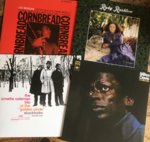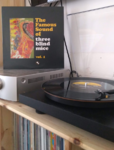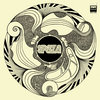You are using an out of date browser. It may not display this or other websites correctly.
You should upgrade or use an alternative browser.
You should upgrade or use an alternative browser.
Jazz
- Thread starter Captainfog
- Start date
Selaws
Well-Known Member
I have seen this pop up a could of times now. Im up for buying it but was hoping someone on here would have picked it up first and can comment on it?I feel likely I completely missed this amongst all the fantastic reissues going around, so perhaps I'm not the only one. Miles Davis - "The complete" Birth of the Cool getting a vinyl pressing with the original compilation album mastered from the original tapes plus live recordings. The fact it's getting a later digital and cd release despite already being out there might suggest a bit of work on cleaning up those live recordings? I don't know but I'm intrigued
View attachment 829
Im seeing them in London on the bank holiday Monday. On their Instagram story they have been plugging away highlighting that they still have tickets for a lot of the gigs, so worth checking to see where else they are performing.Jeez - I’ve probably been missing out on years of gems! Just noticed that Maisha are playing the day after I leave which is annoying
surrealmadrid75
Member
I'll be seeing them at the We Out Here festival but are they at the Cross the Tracks festival too? Think I may have to go to that considering it's on a Sunday with an earlish finish - means I can get a train back no hassleI have seen this pop up a could of times now. Im up for buying it but was hoping someone on here would have picked it up first and can comment on it?
Im seeing them in London on the bank holiday Monday. On their Instagram story they have been plugging away highlighting that they still have tickets for a lot of the gigs, so worth checking to see where else they are performing.
Selaws
Well-Known Member
Ah brilliant! Yeah they are at Cross The Tracks as well. I'm really looking forward to that festival. Line line-up is fantastic and I just read that they are having a record fair on site as well. I entered a comp through them and won upgraded tickets. Not sure what that actually includes but they were really fantastic about it all, messaging to check that I received them, letting me know of updates to the line-up etc.I'll be seeing them at the We Out Here festival but are they at the Cross the Tracks festival too? Think I may have to go to that considering it's on a Sunday with an earlish finish - means I can get a train back no hassle
Mr Moore
Well-Known Member
I like jazz, I own a few jazz records and have been a classics subscriber since it started... so what would everyone consider to be the 10 records that all jazz collections must have? I think I need to go back to basics and fill the gaps in my collection and would be interested to see what you guys recommend.
Hey bud, I was doing a little sorting this morning and I have doubles on these (or at least I will have when the Tone Poet Cornbread happens).

If you want a little jazz starter pack on me, DM me your address. The Miles and Ornette are both seminal albums in their respective styles. Lee was just one helluva magnificent trumpeter from the Hard Bop style and Ruby Rushton are one of my favourite bands from the modern London scene.
Don’t worry if you don’t fancy them, I won’t be offended, they’ll find their way to the PIF thread but I’m always happy to kickstart a jazz collection if I can.
Cheers, Mick x
EDIT: I should add the Ornette and Lee are Blue Note 75th reissues, the Miles a Columbia Legacy reissue and Ruby the OG which was reissued as a double pack with Vol.1 recently. All were bought new and are NM/NM.
Last edited:
Selaws
Well-Known Member
Super nice thing to do there @Mr Moore!Hey bud, I was doing a little sorting this morning and I have doubles on these (or at least I will have when the Tone Poet Cornbread happens).
View attachment 1325
If you want a little jazz starter pack on me, DM me your address. The Miles and Ornette are both seminal albums in their respective styles. Lee is just one helluva magnificent trumpeter from the Hard Bop style and Ruby Rushton are one of my favourite bands from the modern London scene.
Don’t worry if you don’t fancy them, I won’t be offended, they’ll find their way to the PIF thread but I’m always happy to kickstart a jazz collection if I can.
Cheers, Mick x
EDIT: I should add the Ornette and Lee are Blue Note 75th reissues, the Miles a Columbia Legacy reissue and Ruby the OG which was reissued as a double pack with Vol.1 recently. All were bought new and are NM/NM.
Out of interest, how are the 75th reissues? I've been after a copy of At The Golden Circle for a while but always struggle to work out which reissues are the ones to go for.
Mr Moore
Well-Known Member
Super nice thing to do there @Mr Moore!
Out of interest, how are the 75th reissues? I've been after a copy of At The Golden Circle for a while but always struggle to work out which reissues are the ones to go for.
Honestly, I think they largely get a bad rap for the prices they often drop to. I don't have many, maybe 10 including those above and really only Sam Rivers' Fuchsia Swing Song is terrible and it really is bad, lots of crackle and even distortion on some of the playing. The rest are what I'd consider a standard priced, standard issue album nowadays to sound like. I don't have the best set-up, nor ears in the world though so YMMV and indeed it has for many of the commenters here. I personally think it's an ignorance is bliss situation though in that the Ornette sounds absolutely fine and then I got an OG recently and it's night and day just how good that sounds in comparison but whether that justifies the cost is down to personal preference really.
Selaws
Well-Known Member
Cheers for this @Mr Moore. I wouldn't consider myself to have the best ears in the world either.Honestly, I think they largely get a bad rap for the prices they often drop to. I don't have many, maybe 10 including those above and really only Sam Rivers' Fuchsia Swing Song is terrible and it really is bad, lots of crackle and even distortion on some of the playing. The rest are what I'd consider a standard priced, standard issue album nowadays to sound like. I don't have the best set-up, nor ears in the world though so YMMV and indeed it has for many of the commenters here. I personally think it's an ignorance is bliss situation though in that the Ornette sounds absolutely fine and then I got an OG recently and it's night and day just how good that sounds in comparison but whether that justifies the cost is down to personal preference really.
I have been eyeing up an mono copy on discogs for a while now and have just put the order in for that. I think if you'd have said its noticeably better then I would have put an order for the 75th edition, but as I was able to pick up this cheap I will take the risk. The vinyl is Very Good, with a good+ sleeve (im more interested in the record than the sleeve so im fine with this). Hopefully it plays through well and if not I will PIF it and look into picking up a reissue. Thanks again
Selaws
Well-Known Member
https://tompkinssquare.bandcamp.com/album/after-the-rain-a-night-for-coltrane
I have spent the morning listening to this. Really great playing from Teodross Avery, a musician I hadn't heard of until now. I came to see this bandcamp page as Ben Ratliff has written the liner notes for it (hes written some stellar books, one specifically on Coltrane). Really impressed and its limited to 500 copies on vinyl. I might have a look at picking it up, I know Norman records and Banquet Records have copies.
I have spent the morning listening to this. Really great playing from Teodross Avery, a musician I hadn't heard of until now. I came to see this bandcamp page as Ben Ratliff has written the liner notes for it (hes written some stellar books, one specifically on Coltrane). Really impressed and its limited to 500 copies on vinyl. I might have a look at picking it up, I know Norman records and Banquet Records have copies.
RecordTown
New Member
That’s amazing, thank you!Hey bud, I was doing a little sorting this morning and I have doubles on these (or at least I will have when the Tone Poet Cornbread happens).
View attachment 1325
If you want a little jazz starter pack on me, DM me your address. The Miles and Ornette are both seminal albums in their respective styles. Lee was just one helluva magnificent trumpeter from the Hard Bop style and Ruby Rushton are one of my favourite bands from the modern London scene.
Don’t worry if you don’t fancy them, I won’t be offended, they’ll find their way to the PIF thread but I’m always happy to kickstart a jazz collection if I can.
Cheers, Mick x
EDIT: I should add the Ornette and Lee are Blue Note 75th reissues, the Miles a Columbia Legacy reissue and Ruby the OG which was reissued as a double pack with Vol.1 recently. All were bought new and are NM/NM.
Mr Moore
Well-Known Member
That’s amazing, thank you!
No worries, mate. Send me your deets and I'll get them out to you this week.
Dark Star Boogie
Well-Known Member
Does “mastered from the original tapes” = all analogue?I feel likely I completely missed this amongst all the fantastic reissues going around, so perhaps I'm not the only one. Miles Davis - "The complete" Birth of the Cool getting a vinyl pressing with the original compilation album mastered from the original tapes plus live recordings. The fact it's getting a later digital and cd release despite already being out there might suggest a bit of work on cleaning up those live recordings? I don't know but I'm intrigued
View attachment 829
phramenma
Well-Known Member
Depends on how they do the re-mastering - to me that doesn't imply all analogue.Does “mastered from the original tapes” = all analogue?
Clint Howard
Well-Known Member
Where's all the love for my man David Axelrod? From his work producing for Harold Land to the Adderly Brothers to his jazz funk masterpieces recorded with the Wrecking Crew.. and yet, so many jazz threads with not a single mention of him.
phramenma
Well-Known Member
Joel Ross - Kingmaker

 app.vinylmeplease.com
app.vinylmeplease.com
Storf's Notes: This is an incredible jazz album that might not be on vinyl if we hadn't asked Blue Note to do this press; it feels like he's the new Bobby Hutcherson on this record. One of the best jazz albums of 2019.

Joel Ross Kingmaker 'KingMaker' | Vinyl Me, Please
"If 2018 was the year Chicago-born, Brooklyn-based vibraphonist Joel Ross kept turning up on acclaimed album after acclaimed album (Makaya McCraven Universal Beings, Walter Smith III & Matthew Stevens In Common, James Francies Flight, Marquis Hill Modern Flows, Vol. 2), then 2019 is his year to...
Storf's Notes: This is an incredible jazz album that might not be on vinyl if we hadn't asked Blue Note to do this press; it feels like he's the new Bobby Hutcherson on this record. One of the best jazz albums of 2019.
Last edited:
phramenma
Well-Known Member
Spaza - Spaza


Conceived in the Mushroom Hour Half Hour lab, SPAZA is a band with no permanent personnel, with each lineup assembled for the express purpose of recording once-off improvised or workshopped material. For this, the initial salvo, SPAZA was put together from a group of musicians with individual and collective links to Johannesburg’s jazz, afro funk and experimental electro scenes.
In the context of this completely improvised album, the term “spaza” not only refers to the gallery in Troyeville, Johannesburg where this project was recorded live (and in one take) in the autumn of 2015, but to South Africa’s thousands of informal neighbourhood stores.
In South Africa, “spaza” has come to signify an entrepreneurial spirit, especially in the country’s black townships where economic barriers to business ownership mean that only a few can attain the status of formal business ownership. In the country’s socio-political context, spazas, usually operating out of converted garages, shacks or repurposed shipping containers, are also contested territories. They are sites of often fatal bloodshed where financially disenfranchised South Africans routinely mete out their frustrations on those they consider “foreigners” and “outsiders”. It is these outsiders who have come to dominate the spaza economy. However, spazas are also colourful, with their facades branded, styled and designed by each owner. They can often become the nerve centres of social activity in the communities they occupy and are often stocked with an array of iconic South African brands and products, many of which are referenced in the track names of this album.
Perhaps obliquely, there are musical sensibilities to be grasped at the mention of the term. “Spaza,” the recording, the location, the revolving ensemble - all evoke a spirit of independence, a D.I.Y aesthetic, a propensity for spontaneity, and, literally, a coming together of minds at the corner to shoot the breeze or let off a seriously considered prognosis.
True to this, there is a heightened and sustained sense of intuition running through this recording whose sonic palette is so wide it captures - through soundscaping, invocation, lament, impressionistic vocal weaving - not only the transient and hybridised nature of life in Johannesburg, but also the heaviness of the air at the time of its recording. More ambient, controlled swirl of rhythm and experimental mixing than incessant groove, the album is an outpouring of a range of expressions that exist between the supposed binaries of indigenous forms of music and the electronic experimentation Johannesburg is known globally for. Between percussionist Gontse Makhene on the bottom end of the scale, and sound sculptor Joao Orrechia on the nebulous end of it, vocalists Nosisi Ngakane and Siya Makuzeni (who also plays trombone) marshal a vocal experiment that is as tense as it is playful. From their respective posts, bass player Ariel Zarmonsky and string wizard Waldo Alexander stitch, stretch and add body to the various strands of sound being created.
There is an intelligence to the vocal sculpting that gives structure and coherence to the music, creating a sonic monolith that honours various aspects of South African life, including divination, burial rites, as well as the precariousness of a simple trip to the cornerstone. The interlude Tigerbalm noBuhlebakho, for instance, relays the sometimes charged atmosphere of a trip to the spaza, one laced with catcalling indicative of the war over womens' bodies. While this can end in violence and, in some cases, death, ultimately this album seems to point to the liberating feeling of levitating above it all.
At times opaque, and at others direct, SPAZA is always unyielding and propulsive. This could be the sound of the city turned inside out, ruminating on its troubled history and ever morphing present. There are pensive and celebratory streaks crisscrossing the album, not to
mention a vulnerability that is in keeping with the spontaneous ethos of Mushroom Hour Half Hour. The results, shaped in the Pan African milieu that is Johannesburg, is a freewheeling representation of continental astral travel.
In the context of this completely improvised album, the term “spaza” not only refers to the gallery in Troyeville, Johannesburg where this project was recorded live (and in one take) in the autumn of 2015, but to South Africa’s thousands of informal neighbourhood stores.
In South Africa, “spaza” has come to signify an entrepreneurial spirit, especially in the country’s black townships where economic barriers to business ownership mean that only a few can attain the status of formal business ownership. In the country’s socio-political context, spazas, usually operating out of converted garages, shacks or repurposed shipping containers, are also contested territories. They are sites of often fatal bloodshed where financially disenfranchised South Africans routinely mete out their frustrations on those they consider “foreigners” and “outsiders”. It is these outsiders who have come to dominate the spaza economy. However, spazas are also colourful, with their facades branded, styled and designed by each owner. They can often become the nerve centres of social activity in the communities they occupy and are often stocked with an array of iconic South African brands and products, many of which are referenced in the track names of this album.
Perhaps obliquely, there are musical sensibilities to be grasped at the mention of the term. “Spaza,” the recording, the location, the revolving ensemble - all evoke a spirit of independence, a D.I.Y aesthetic, a propensity for spontaneity, and, literally, a coming together of minds at the corner to shoot the breeze or let off a seriously considered prognosis.
True to this, there is a heightened and sustained sense of intuition running through this recording whose sonic palette is so wide it captures - through soundscaping, invocation, lament, impressionistic vocal weaving - not only the transient and hybridised nature of life in Johannesburg, but also the heaviness of the air at the time of its recording. More ambient, controlled swirl of rhythm and experimental mixing than incessant groove, the album is an outpouring of a range of expressions that exist between the supposed binaries of indigenous forms of music and the electronic experimentation Johannesburg is known globally for. Between percussionist Gontse Makhene on the bottom end of the scale, and sound sculptor Joao Orrechia on the nebulous end of it, vocalists Nosisi Ngakane and Siya Makuzeni (who also plays trombone) marshal a vocal experiment that is as tense as it is playful. From their respective posts, bass player Ariel Zarmonsky and string wizard Waldo Alexander stitch, stretch and add body to the various strands of sound being created.
There is an intelligence to the vocal sculpting that gives structure and coherence to the music, creating a sonic monolith that honours various aspects of South African life, including divination, burial rites, as well as the precariousness of a simple trip to the cornerstone. The interlude Tigerbalm noBuhlebakho, for instance, relays the sometimes charged atmosphere of a trip to the spaza, one laced with catcalling indicative of the war over womens' bodies. While this can end in violence and, in some cases, death, ultimately this album seems to point to the liberating feeling of levitating above it all.
At times opaque, and at others direct, SPAZA is always unyielding and propulsive. This could be the sound of the city turned inside out, ruminating on its troubled history and ever morphing present. There are pensive and celebratory streaks crisscrossing the album, not to
mention a vulnerability that is in keeping with the spontaneous ethos of Mushroom Hour Half Hour. The results, shaped in the Pan African milieu that is Johannesburg, is a freewheeling representation of continental astral travel.
pijo
Member
Joel Ross - Kingmaker

Joel Ross Kingmaker 'KingMaker' | Vinyl Me, Please
"If 2018 was the year Chicago-born, Brooklyn-based vibraphonist Joel Ross kept turning up on acclaimed album after acclaimed album (Makaya McCraven Universal Beings, Walter Smith III & Matthew Stevens In Common, James Francies Flight, Marquis Hill Modern Flows, Vol. 2), then 2019 is his year to...app.vinylmeplease.com
Storf's Notes: This is an incredible jazz album that might not be on vinyl if we hadn't asked Blue Note to do this press; it feels like he's the new Bobby Hutcherson on this record. One of the best jazz albums of 2019.
I'll be buying this. This for me is where vmp is great - making available cool music that otherwise isn't available on vinyl. I was pondering on the old forum why Blue Note are so sporadic with their new releases but in this case vmp steps in, I'm all for more of that.
phramenma
Well-Known Member
I'll be buying this. This for me is where vmp is great - making available cool music that otherwise isn't available on vinyl. I was pondering on the old forum why Blue Note are so sporadic with their new releases but in this case vmp steps in, I'm all for more of that.
pijo
Member
Ooohhhh it's getting a wider release? I'm out of the loop!You can get this record for $21 in the US - and probably for similar prices around the world...
Edit: I'm back in the loop! I'm glad that's happening, I hope Blue Note continue to do this, I'm sure there's a market for them

